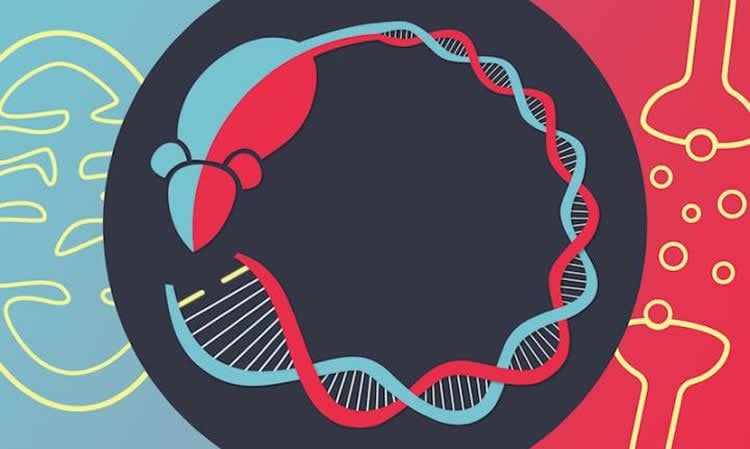Summary: Researchers report mitochondrial dysfunction may affect the activity of serotonergic neurons in mice with ANT1 mutations. The findings may provide insight into the origins of bipolar disorder.
Source: RIKEN.
Mutations in the gene ANT1 may confer a risk for bipolar disorder through a complex interplay between serotonin and mitochondrial signaling in the brain. These two pathways have been separately implicated in bipolar disorder, but the link between levels of the neurotransmitter serotonin and mitochondrial dysfunction had not been established. Researchers at the RIKEN Center for Brain Science (CBS) in Japan now report that mitochondrial dysfunction affects the activity of serotonergic neurons in mice with mutations of ANT1.
Mitochondria are the vital organelles that deliver energy to all cells and mitochondrial damage has been found, for example, in brain imaging of bipolar patients and in post-mortem brains. Roughly 20% of patients with mitochondrial disease also have bipolar disorder, a major psychiatric disease characterized by manic and depressive episodes. Altered serotonin functioning, on the other hand, seems to be involved in bipolar disorder because drugs that target serotonin levels can effectively treat the condition. “Our study suggests that mitochondrial dysfunction can alter activity of serotonergic neurons in bipolar disorder, and this is the first time these two lines of evidence have been linked,” says Tadafumi Kato, research group leader at CBS. The research was published on June 8 in the journal Molecular Psychiatry.

The study started by identifying ANT1 mutations in patients with bipolar disorder. Kato and colleagues then looked at mice lacking the ANT1 gene in the brain only. Compared with non-mutant mice, the mitochondria in these knockout mice could not retain calcium and had leakier pores. The ANT1-mutant mice also showed lower impulsivity in behavior tests, and consistent with this, their brains showed elevated serotonin turnover. This hyper-serotonergic state is likely a result of a cascade of changes that starts with the loss of the ANT1 gene and the resulting dysfunctional mitochondria. Enhanced serotonergic activity may then further impair mitochondria in a vicious cycle.
Serotonergic neurons were found to deteriorate in a brain area called the dorsal raphe, which is a region also affected in Parkinson’s disease–another condition that may have its roots in mitochondrial dysfunction. The ANT1 mutation does not cause bipolar disorder, says Kato, but is associated with elevated risk. The implication of this research is that emerging therapies for the underlying mitochondrial dysfunction could one day treat bipolar disorder more successfully than today’s variable serotonin-targeting drugs.
Source: Adam Phillips – RIKEN
Publisher: Organized by NeuroscienceNews.com.
Image Source: NeuroscienceNews.com image is credited to Milena Menezes Carvalho/RIKEN National Science Institute.
Original Research: Open access research for “Ant1 mutant mice bridge the mitochondrial and serotonergic dysfunctions in bipolar disorder” by Tomoaki M. Kato, Mie Kubota-Sakashita, Noriko Fujimori-Tonou, Fumihito Saitow, Satoshi Fuke, Akira Masuda, Shigeyoshi Itohara, Hidenori Suzuki & Tadafumi Kato in Molecular Psychiatry. Published June 11 2018
doi:10.1038/s41380-018-0074-9
[cbtabs][cbtab title=”MLA”]RIKEN “Mutation Links Bipolar Disorder to Mitochondrial Disease.” NeuroscienceNews. NeuroscienceNews, 11 June 2018.
<https://neurosciencenews.com/mitochondria-bipolar-9306/>.[/cbtab][cbtab title=”APA”]RIKEN (2018, June 11). Mutation Links Bipolar Disorder to Mitochondrial Disease. NeuroscienceNews. Retrieved June 11, 2018 from https://neurosciencenews.com/mitochondria-bipolar-9306/[/cbtab][cbtab title=”Chicago”]RIKEN “Mutation Links Bipolar Disorder to Mitochondrial Disease.” https://neurosciencenews.com/mitochondria-bipolar-9306/ (accessed June 11, 2018).[/cbtab][/cbtabs]
Abstract
Ant1 mutant mice bridge the mitochondrial and serotonergic dysfunctions in bipolar disorder
Although mitochondrial and serotonergic dysfunctions have been implicated in the etiology of bipolar disorder (BD), the relationship between these unrelated pathways has not been elucidated. A family of BD and chronic progressive external ophthalmoplegia (CPEO) caused by a mutation of the mitochondrial adenine nucleotide translocator 1 (ANT1, SLC25A4) implicated that ANT1 mutations confer a risk of BD. Here, we sequenced ANT1 in 324 probands of NIMH bipolar disorder pedigrees and identified two BD patients carrying heterozygous loss-of-function mutations. Behavioral analysis of brain specific Ant1 heterozygous conditional knockout (cKO) mice using lntelliCage showed a selective diminution in delay discounting. Delay discounting is the choice of smaller but immediate reward than larger but delayed reward and an index of impulsivity. Diminution of delay discounting suggests an increase in serotonergic activity. This finding was replicated by a 5-choice serial reaction time test. An anatomical screen showed accumulation of COX (cytochrome c oxidase) negative cells in dorsal raphe. Dorsal raphe neurons in the heterozygous cKO showed hyperexcitability, along with enhanced serotonin turnover in the nucleus accumbens and upregulation of Maob in dorsal raphe. These findings altogether suggest that mitochondrial dysfunction as the genetic risk of BD may cause vulnerability to BD by altering serotonergic neurotransmission.






